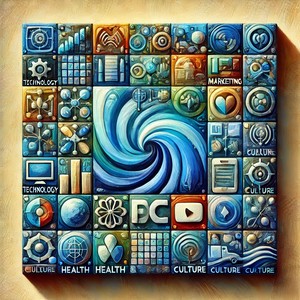0:00
What makes a society more than just a
0:02
group of people living in the same
0:03
place? The answer is culture. It's the
0:06
invisible thread weaving through
0:08
language, traditions, art, and values,
0:11
creating the foundation of human
0:13
connection. Without culture, societies
0:16
would lack identity, direction, and
0:18
unity. At its simplest, culture means
0:22
the shared ways of living that people
0:23
learn and pass on. From the food we eat
0:26
to the way we celebrate milestones,
0:28
culture is not something we are born
0:30
with. It's something we acquire. This
0:33
makes it one of the most powerful forces
0:35
shaping individuals and communities
0:38
Culture is learned, not inherited. No
0:41
child is born speaking a language or
0:43
practicing customs. These are taught
0:46
through family, school, and society,
0:48
shaping personality and worldview.
0:51
It is shared. Culture belongs to groups,
0:56
Whether it's music, holidays, or social
0:59
norms. The collective experience gives
1:01
people a sense of belonging.
1:04
Culture is symbolic. Flags, songs, or
1:08
even gestures carry meaning far beyond
1:10
their physical form. Symbols unite
1:12
people around common ideas and values.
1:15
It is also integrated. Every element of
1:18
culture connects with others. Religion,
1:21
economy, education, and politics all
1:23
influence one another, creating a
1:26
complex but balanced system. Culture is
1:29
dynamic. It evolves as societies adapt
1:32
to new challenges, technologies, and
1:34
influences. What was once tradition may
1:37
change, yet it still carries the essence
1:41
It is patterned. Practices like
1:44
greetings, marriage rituals, or even
1:46
dining etiquette follow structured rules
1:48
that make social life predictable and
1:52
Culture is transmitted through language,
1:55
stories, rituals, and institutions. It
1:58
is passed from generation to generation,
2:00
ensuring societies don't lose their
2:02
identity. And culture is universal.
2:06
Every human group develops it. Proving
2:08
that while practices differ, the
2:10
existence of culture is what makes us
2:12
distinctly human. Understanding culture
2:15
is not just about sociology. It's about
2:17
awareness. It helps us appreciate our
2:20
roots and respect others. In a
2:22
globalized world, seeing how culture
2:24
defines society makes us more empathetic
2:28
So, which characteristic of culture do
2:31
you think has the biggest impact on
2:32
shaping today's world?

